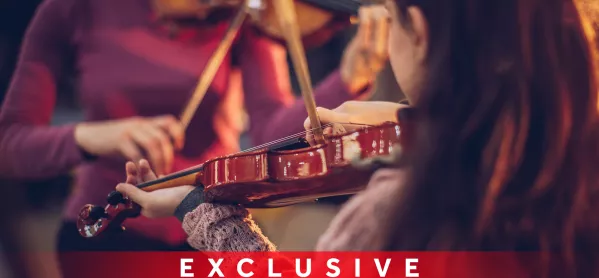Omicron: Subject leader ‘anger’ at idea of ‘suspending’ music

Music teachers have reacted with “anger and incredulity” at a suggestion by a senior education figure that schools could suspend “specialist” subjects in order to fill staffing gaps elsewhere.
On Monday, Tes revealed Ofqual chair and academy chief Ian Bauckham had suggested “emergency timetable changes” that could see the teaching of subjects such as music and PSHE paused to help schools deal with the disruption caused by Omicron.
But Mr Bauckham, who posted his comments on a Department for Education portal for heads, has received a strong backlash from three bodies representing music teachers and leaders.
Subject association Music Mark and the Music Teachers’ Association (MTA) have released a joint statement calling Mr Bauckham’s words “short-sighted and “badly judged”.
Meanwhile, the Incorporated Society of Musicians (ISM), which represents UK music teachers and subject leads, has written a letter to Mr Bauckham - as well as schools minister Robin Walker - voicing its concerns.
All three organisations say the idea to suspend music teaching would be at odds with government policy.
ISM chief executive Deborah Annetts’ letter refers to the inclusion of music education in government guidance published in November, on the importance of a broad and balanced curriculum to schools’ Covid recovery work.
The guidance stresses that a “key priority in all key stages is a curriculum which allows a return to practical music-making through singing and playing instruments” and encourages schools to “foster pupils’ re-engagement with a wide range of music”.
“Far from advocating a reduction in music lessons, the government recently emphasised the importance of music education as part of the recovery curriculum in schools,” Ms Annetts writes.
- Ofqual boss: Pausing specialist subjects could free up teachers
- Opinion: Why you need to embed music into every lesson
- Ofsted: Ofsted warns schools over ‘unbroken’ KS3 music teaching
- Zahawi: Avoiding remote learning could be impossible
- Teacher absence: ‘Combining classes’ can keep pupils in school, heads told
Despite this guidance, music has been “disproportionately affected by the pandemic”, the letter warns.
“To suspend music lessons, even temporarily, would cause even more damage to the subject,” it continues, adding that the comments also send “an unhelpful message to headteachers about prioritising core subjects to the detriment of a broad and balanced curriculum”.
Music Mark and MTA’s joint statement highlights that state schools have a statutory duty to deliver a full curriculum, including music, up to the end of key stage 3.
The organisations also cite the DfE’s Model Music Curriculum, published last March, which states: “The sheer joy of music-making can feed the soul of a school community, enriching each student while strengthening the shared bonds of support and trust which make a great school.”
‘Insensitive and badly judged’
Don Gillthorpe, president of the MTA, said: “There is understandable anger and incredulity among the music education community about this insensitive and badly judged statement. Decisions on risk assessments and contingency measures are made at a local level by individual headteachers, but such a proposal from a respected voice will, unfortunately, be noticed and emulated.”
He added: “Music is part of pupils’ entitlement to a broad and balanced curriculum and the pandemic does not alter this; we must encourage schools to find solutions to these challenges that protect access to the full breadth of subjects.”
Ofsted has previously stressed the importance of the music curriculum, saying that schools should provide “regular, unbroken” music learning for KS3 pupils, and that the subject should not be part of a “carousel”.
The DfE was contacted for comment.
After Tes’ story was published on Monday, an Ofqual spokesperson emphasised Mr Bauckham had not written the piece as part of his work at the regulator.
You need a Tes subscription to read this article
Subscribe now to read this article and get other subscriber-only content:
- Unlimited access to all Tes magazine content
- Exclusive subscriber-only stories
- Award-winning email newsletters
Already a subscriber? Log in
You need a subscription to read this article
Subscribe now to read this article and get other subscriber-only content, including:
- Unlimited access to all Tes magazine content
- Exclusive subscriber-only stories
- Award-winning email newsletters



